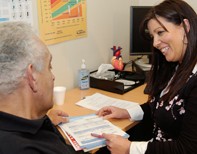Peer Reviewed
Feature Article COPD
COPD: practical aspects of case finding, diagnosing and monitoring
Abstract
Does my patient have chronic obstructive pulmonary disease (COPD), and does it matter?
Key Points
- Diagnosis of COPD is often delayed and a high proportion of cases in primary care are unrecognised.
- COPD is often misdiagnosed in primary care, probably as a result of not using spirometry for diagnosis.
- Screening systematically or opportunistically with questionnaires can be used to case-find in general practice. Expiratory flow devices are used to determine the need for diagnostic testing.
- Spirometry is essential to diagnose COPD. COPD is present if the post-bronchodilator FEV1/FVC ratio is below 0.7 and FEV1 is less than 80% predicted.
- Telling smokers their ‘lung age’ after spirometry increases their chances of successfully quitting.
- The results of spirometry together with symptoms and exacerbation frequency guides the management of COPD.
- Complex lung function tests to distinguish between asthma and COPD are not usually required.
Purchase the PDF version of this article
Already a subscriber? Login here.

